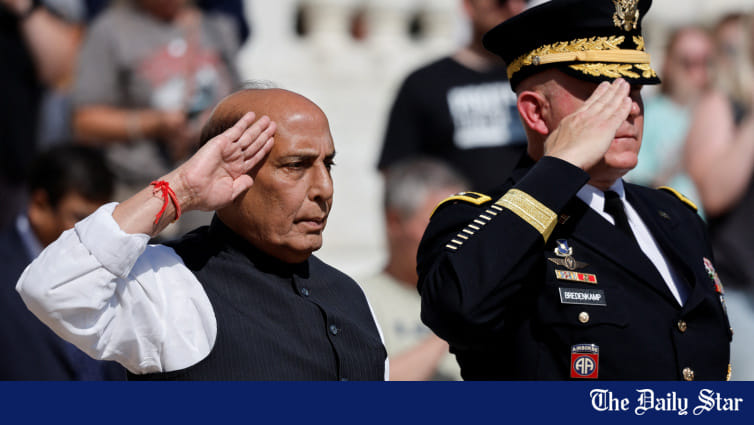Saif
Senior Member
- Joined
- Jan 24, 2024
- Messages
- 15,973
- Likes
- 8,002
- Nation

- Axis Group

Indian defence minister urges military to watch out for conflicts in Bangladesh, China
Published :
Sep 07, 2024 11:59
Updated :
Sep 07, 2024 11:59

India’s Defence Minister Rajnath Singh has urged the country’s armed forces to analyse the ongoing conflicts between Israel-Hamas, Russia-Ukraine, and the current state of affairs in Bangladesh to prepare India for the “unexpected”.
He made the remarks on Thursday during a joint commanders’ conference in India’s Lucknow, according to the Indian newspaper The Telegraph, reports bdnews24.com.
Singh underscored the need for a thorough analysis in light of the recent circumstances in the India-China border and neighbouring countries “which are posing a challenge to peace and stability in the region”.
He also emphasised on a coordinated and proportionate response to provocation for any challenges India may face during future wars.
“Despite global volatility, India is enjoying a rare peace dividend and it is developing peacefully. However, due to the increasing number of challenges, we need to remain alert,” he was quoted as telling the commanders.
“We need to focus on our present, keep an eye on the activities happening around us at present, and focus on being future-oriented.
“For this, we should have a strong and robust national security component. We should have a fail-proof deterrence,” Singh was quoted saying.
He also highlighted the significance of using artificial intelligence to develop electronic and space warfare.
“These components do not participate in any conflict or war directly. Their indirect participation is deciding the course of warfare to a great extent,” he added.
While referring to India as a ‘peace-loving’ nation, he stressed that the Indian armed forces need to be ready for war to “preserve peace”.
His comments have stirred curious reactions in Bangladesh as they come in the context of the collapse of the government of Sheikh Hasina who has fled to India.
Former prime minister Hasina has long been regarded as one of India’s closest allies.
There has been a growing surge of anti-India sentiments and rhetoric in Bangladesh, especially since the massive July-August protests that overthrew the Hasina government.
Published :
Sep 07, 2024 11:59
Updated :
Sep 07, 2024 11:59
India’s Defence Minister Rajnath Singh has urged the country’s armed forces to analyse the ongoing conflicts between Israel-Hamas, Russia-Ukraine, and the current state of affairs in Bangladesh to prepare India for the “unexpected”.
He made the remarks on Thursday during a joint commanders’ conference in India’s Lucknow, according to the Indian newspaper The Telegraph, reports bdnews24.com.
Singh underscored the need for a thorough analysis in light of the recent circumstances in the India-China border and neighbouring countries “which are posing a challenge to peace and stability in the region”.
He also emphasised on a coordinated and proportionate response to provocation for any challenges India may face during future wars.
“Despite global volatility, India is enjoying a rare peace dividend and it is developing peacefully. However, due to the increasing number of challenges, we need to remain alert,” he was quoted as telling the commanders.
“We need to focus on our present, keep an eye on the activities happening around us at present, and focus on being future-oriented.
“For this, we should have a strong and robust national security component. We should have a fail-proof deterrence,” Singh was quoted saying.
He also highlighted the significance of using artificial intelligence to develop electronic and space warfare.
“These components do not participate in any conflict or war directly. Their indirect participation is deciding the course of warfare to a great extent,” he added.
While referring to India as a ‘peace-loving’ nation, he stressed that the Indian armed forces need to be ready for war to “preserve peace”.
His comments have stirred curious reactions in Bangladesh as they come in the context of the collapse of the government of Sheikh Hasina who has fled to India.
Former prime minister Hasina has long been regarded as one of India’s closest allies.
There has been a growing surge of anti-India sentiments and rhetoric in Bangladesh, especially since the massive July-August protests that overthrew the Hasina government.





































